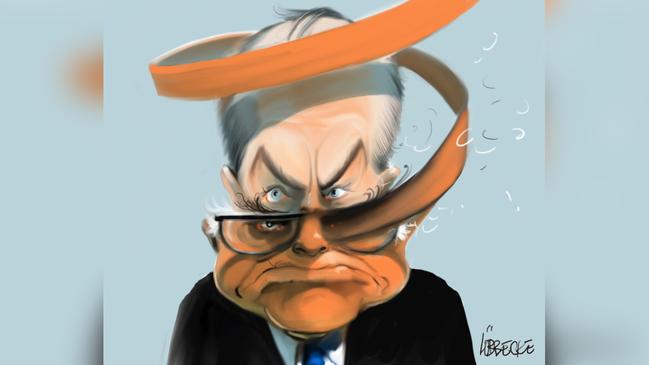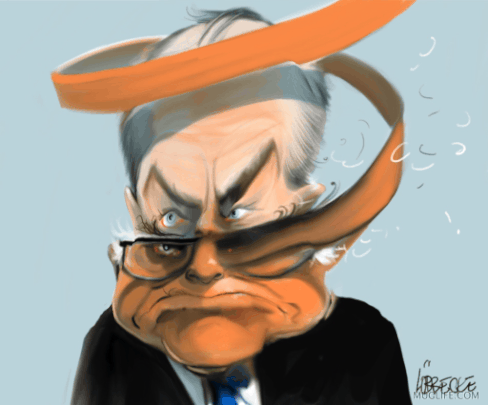Survivor Shorten defies bad press to close in on the Lodge
His policies may well bring him undone in government, but if Bill Shorten gets there, he’ll have done something no one else has.

For Australians to wake up the day after the next federal election without Bill Shorten as prime minister, Scott Morrison will need to have orchestrated the biggest comeback in our political history.
Fifty consecutive Newspoll fails alongside worsening numbers since deposing Malcolm Turnbull as prime minister suggests the degree of difficulty for a Morrison comeback is well beyond him.
Which brings us to the story of Shorten’s unlikely rise. It has been remarkable, and make no mistake — whether you agree or disagree with his policy agenda, it is significant and will have a profound impact on the direction of this country. Shorten has worked his way to the cusp of becoming prime minister despite significant obstacles. For starters he was a key figure in the downfalls of Kevin Rudd and Julia Gillard. Yet he has avoided the taint that goes with being the political assassin.
Labor changed its rules on electing leaders, giving the membership 50 per cent of the say alongside the caucus. That shift favours the Left faction — because it has a greater share of the lay membership — and Shorten’s opponent Anthony Albanese, from the Left, amassed 60 per cent of the membership vote but couldn’t win over enough members of the parliamentary caucus to translate that into victory.
One of the reasons for that was Shorten’s ability to work the numbers, just as he did against Rudd and then Gillard.

Having won the vote in an almost direct violation of the aim of the new rules — to empower the lay members — Shorten has survived six years of Australians knowing he wasn’t wanted by most of the Labor faithful. Polls repeatedly back their judgment, showing Albanese is the more popular Labor leader. Even Shorten’s deputy, Tanya Plibersek, regularly polls as more popular.
Only one first-term opposition leader has gone on to become prime minister: Andrew Fisher in 1914. But he had been prime minister before, just a year earlier.
If Shorten wins the election less than two months from now, he will do something no one else has done: take over the remnants of a defeated government humiliatingly dispatched from power and survive six years in the wilderness before returning to office.
Since the early days of his leadership, Shorten has been criticised for lacking charisma. He survived a politically motivated royal commission into the unions, which included comments from the commissioner that specifically targeted the Opposition Leader’s character. There was even a criminal investigation into Shorten during his time as leader, allegations that dated back decades. Charges weren’t laid but the potential taint of such allegations often sinks political careers. Not Shorten’s.
When the Liberals emulated Labor and deposed a first-term prime minister, Shorten had to recalibrate his attacks against a far more popular opponent, and on the eve of an election no one expected him to win. Using the scare campaign tactics of Tony Abbott from 2013, Shorten mounted a campaign to discredit Turnbull’s government on health, coming within a whisker of taking away the Coalition’s majority.
In his second term as Opposition Leader he came under pressure when polls suggested a series of by-elections might go against the opposition, after Labor MPs whom Shorten said didn’t have a problem with dual citizenship fell foul of section 44 of the Constitution. Instead, the results went Labor’s way and the fallout was on the government side.
Despite his personal unpopularity, the precarious position of the newly minted Labor opposition and the fact there were more popular alternative leaders lurking in Shorten’s ranks, he still authorised a radical policy agenda for the 2016 election, which has been expanded for this election. It is the most comprehensive agenda since John Hewson’s Fightback package in 1993.
While there are plenty of questionable ideas within the plan, there is no doubt Shorten decided winning wasn’t enough. He didn’t want to come to government like Rudd or Abbott, running a small-target agenda or nothing more than a scare campaign against the government. Doing so is an effective way of obtaining power, but retaining it requires a mandate courtesy of spelled-out policies.
Shorten’s policies may bring him undone in government, but that will be on his terms. Going into government, Labor has substantial reform plans on tax and industrial relations, as well as a series of social policy scripts that are radically different to what Morrison is offering. As Paul Kelly suggested in this newspaper last weekend, Labor has captured the zeitgeist.
Finally, Team Shorten will be a new-look government for this country. Yes, there will be many familiar faces, ministers who Labor will hope have learned from the failures of the previous Labor government; who come into government better prepared this time, with more experience. It’s not entirely analogous but the circumstances are similar to the way the new team of Bob Hawke came into government in 1983, having learned from the failures of Gough Whitlam’s administration.
But there also are new names who will take important seats at the table. Shorten has pledged to install former NSW premier Kristina Keneally into cabinet, as well as the father of reconciliation, Pat Dodson.
The diversity of Shorten’s cabinet will be unmatched in Australian history, and his government will be the first in this country’s history to be genuinely reflective of the gender balance in the population — half men, half women — and with more powerful female decision-makers in frontbench ranks than ever.
It is easy to knock Shorten, to write him off, to underestimate him. Most commentators and members of the public have been doing that for years. Frankly, despite the tale above, I still assume he’ll stumble once in power — weighed down by his agenda, which risks going against the changing economic climate. Policies that aren’t properly formed — such as Labor’s emissions target — may stifle success. Or the challenges of passing laws through the Senate may expose Shorten.
But time and again this unpopular, uncharismatic Labor leader has defied negative expectations, and he has done so without personal ratings to crow about, and without the power of incumbency.
Once in office, if Shorten doesn’t fail at the election and depose Hewson for the title of losing the unlosable election, he will get a fresh start. New prime ministers always do. Shorten’s personal numbers will soar after he is sworn in. His authority internally will only grow.
As long as hubris doesn’t take over — a silent risk for Shorten — honeymoon popularity just may fix the one failure he has never been able to overcome: building a bond with the public in the way Hawke or eventually John Howard did.
Hawke came into office with such popularity; Howard did not. Howard’s popularity grew across time. Shorten’s political hero is Hawke. Howard was a Liberal prime minister who inspired Shorten to run for the other side.
Yet if Shorten is to build into a successful prime minister, he will follow the Howard developmental script, not Hawke’s, albeit with a radically different policy agenda to go with it.
Peter van Onselen is a professor in politics at the University of Western Australia and Griffith University.



